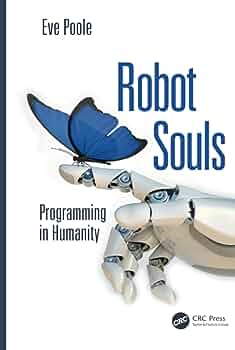Robot Souls
Programming in Humanity


Eve Poole is a leadership academic. She studied theology at Durham University which took her to work at the Church Commissioners, the charity that manages the Church of England’s assets. She then gained an MBA at Edinburgh University Business School, before joining Deloitte’s as a change management consultant. In 2010 she completed her PhD in ‘Capitalism and Theology’ at University of Cambridge. From 2002, she taught leadership for Ashridge Business School, and was the first female Chairman of Gordonstoun School in Moray from 2015-2021. She also served as Third Church Estates Commissioner for England from 2018-2021, and was Interim Chief Executive of the Royal Society of Edinburgh in 2022. She was awarded an OBE in the 2023 New Year Honours List for services to education and gender equality. She brings her experiences and deep knowledge from all these roles into play in this book.
The extraordinary pace of progress of Artificial Intelligence (AI) in recent years, most notably with the ability of us all to access it through the likes of ChatGPT and Google Bard, has put pressure on everyone to understand the threats and opportunities that it presents for us as individuals, as organizations and existentially.
Loose fears of AI presenting us with an existential crisis abound, though it is much more difficult to get anyone to actually present a realistic scenario of how this might occur. There is very little ‘loose’ however in this book. The author embraces the topic of managing AI in a bravura display of knowledge and concision. This book covers a startling breadth of topics in under 150 pages, including some 40 pages of notes and references.
While the title of the book suggests a single enquiry into how we might adapt and evolve AI to behave in a way that is conscientious and self-aware, the foundations for such an exploration require an examination of what is AI, what makes us human and why that is important, and what is the Soul. To do this Poole takes us on a journey through philosophy from the ancients to present-day, global culture, religion, literature, neuroscience and commerce. It is a fascinating and enlightening journey.
The key waymarks are: Iain McGilchrist’s stance on the West’s over-emphasis on data-based left-brain analysis, at the expense of the synthesizing qualities of right-brain perceptions; Moravec’s Paradox, that it is relatively easy to train machines to do things we find difficult (like maths and logic) but difficult to get them to do the things we don’t even think about (like walking, moving, image recognition); and John Searle’s Chinese Room thought-experiment, which highlights the difference between providing an answer and understanding it.
Poole agrees with McGilchrist’s view that we have become overly focused on STEM-based certainty at the expense of humanities-based uncertainty. In a world that has been preaching the existence of VUCA for the last three decades this is peculiar, but in terms of computing no doubt broadly correct. Her particular insight that ties the human brain to the coded one, is that in coding developers write ‘junk code’ that is either redundant or irrelevant, and that for humans we also have code that if appraised by a developer may be classed as junk code, that is it gets in the way of a clean, objective output.
Poole breaks human junk code down into seven elements: emotions, mistakes, story-telling, sixth sense, uncertainty, free will and meaning. None of these elements improves the efficiency of transactions but all are integral to making life richer. They are elements that make us human. Having identified them, we also see that they are fundamental to society, that is without them we would be hugely challenged to build community, and without community we lose the ‘human magic’ that keeps us at the top of the animal hierarchy.
Thus far, the author brilliantly dissects what Bagehot might describe as the efficient and the dignified sides of humanity. When bringing it to AI she suggests that we build-in these seven junk code elements so that AI can acquire these sensibilities too. Something about this jars however, it is both a ‘playing God’ solution, she says “if God made us in his image…we should extend that favour to these new creations that we are making in our image” … “we should be able to prime our AI with as full a range of philosophies of life as we can muster, and give it the capacity to parse them in context”; and there will remain an absence of authenticity about it, we will know that it is only simulated.
Nonetheless, the author takes this polemic out into the open, and provides us with important tools and ideas to further it with. Time remains of the essence, but we will all benefit from understanding this topic better, and Poole’s extended essay is a hugely valuable, entertaining, and informative step forward.
Title: Robot Souls: Programming in Humanity
Author/s Name/s: Eve Poole
Publisher: Routledge – CRC Press (Taylor & Francis)
ISBN:978-1-032-42662-4
Publishing Date: August, 2023
Number of Pages: 154